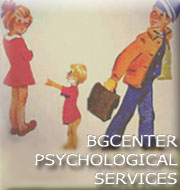
Newsletter
#89 for Internationally Adopting Parents
May 23, 2008
PAL Center Inc.
|
Announcements
|
|
Elina
Polyakov
The families
can plan a therapy session for their child and for themselves concurrently,
|
|
Internet
Digest
|
|
|
|
You receive this
newsletter Copyright@2006-2008 |
Neuropsychological Assessment:
What to Expect?At the BGCenter, where psychological screenings and assessments of all kinds are a daily working routine, some clinical reports of school-based evaluations and even private neuropsychological assessments still puzzle us: what was this work done for if it can't help change anything for the child?
What kind of assessment the parents of a delayed and struggling internationally adopted child need and what they should expect to see in their clinical report?
Below are typical questions the adoptive parents usually ask us during our free initial consultations on the phone.Q. I was told I should do a neuropsychological assessment of my child, but is there any difference with a psycho-educational evaluation?
A. A neuropsychological assessment done at the BGCenter for a school-age child will assess these areas:
- General intellect
- Achievement skills, such as reading and math
- Executive skills, such as organization, planning, inhibition, and flexibility
- Attention
- Learning and memory
- Language
- Visual-spatial skills
- Motor coordination
- Emotional functioning
- Behavior patterns and social skills
Some abilities may be measured in more detail than the others, depending on the child's needs. A detailed developmental history and data from the child's parents and teachers may also be requested. Observing your child in order to understand his or her motivation, cooperation, and behavior is a very important part of this evaluation. The goal of a neuropsychological assessment is not only to measure the level of functioning and separate skills, but to determine the strengths and the ways these could be utilized to compensate for the deficits. Neuropsychological assessment aims at understanding the roots and the specific nature of the child's disability(s) caused by deprivation, abuse, and psychological trauma typical for internationally adopted children, while psycho-educational assessment tends to obtain an overall picture of psychological and educational abilities of the child in order to improve an overall school functioning of this student.
Q. Will a number of tests the clinician will use be a guarantee that the entire assessment is not a wasted time and money?
A. No. We have seen the reports of neuropsychological assessments where dozens of tests were administered, but they are still useless in the long run. All tests are just instruments, tools of the trade. Some are better than others and can provide with more data, but it is up to the professional who uses these instruments to give an interpretation and explanation. Thus it's crucial for the professional working with your child to have experience with, be knowledgeable of, and be sensitive to the issues related to institutionalization and international adoption in order to be able to interpret the data. Even when the history of the child is known, it is difficult for a psychologist who has never dealt with internationally adopted children's issues to change his/her set of mind and to re-examine the ways of assessing and interpreting the results.
Q. What should be the outcome of a neuropsychological assessment of a school age child?
A. In plain words, this kind of assessment must provide parents with a clear, structured and implementable plan of how to work with your child at school and in the family in the next 12-18 months to address his/her developmental and educational needs. Some experts, being skillful clinicians, may still be unfamiliar with special education procedures and the linkage between assessment and intervention in schools. They may end up with purely medical diagnoses and/or unrealistic, vague and irrelevant recommendations, which will be rejected by your school as inappropriate. Other clinicians, and we have seen a fare share of such reports too, will give you an endless list of recommendations that are not structured, pretty much "one size fits all" type, and which would take up 25 hours a day if indeed implemented.
Q. What can be done to insure that a clinical report that concludes a neuropsychological assessment is useful for schools, and the parents are well informed about what has to be done after they receive the report?
A. As it is with everything else:
- Do a good research before you commit to any assessment: the time lost on a useless procedure cannot be recovered for the child.
- Make sure that your chosen specialist is qualified for the job, experienced with the issues of internationally adopted children, and is capable and willing to analyze the developmental history of your child (sometimes it's really a huge amount of documentation). A lot of problems are rooted in this history; underestimating the child's history leads to direct misinterpretation of the existing problems.
- Get a clear and detailed explanation of what is going to happen, and if the goals you have in mind for this evaluation will be addressed by the professional. At the BGCenter, we spell out the details (referral issues and goals of an evaluation) in writing in order to insure that we do exactly what the parents expect us to do.
- Remember that the ultimate goal of an assessment is the recommendation plan tailored to your child's specific situation and implementable by the educational institution of your child. Ask your clinician if he/she has experience with school related procedures and regulations to write a report that can withstand the school's critical review.
From the editor
Sponsors
To unsubscribe
send e-mail to
newsletter-request@bgcenterschool.org
with the subject: unsubscribe


